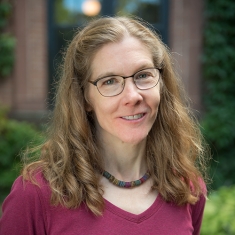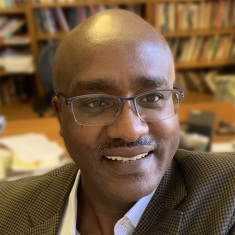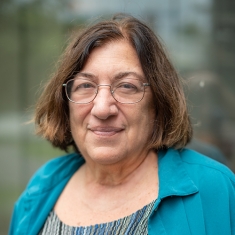World Literatures

The Program in World Literatures (formerly comparative literature) enables students to learn languages and engage with at least two literary and cultural traditions studied in their original languages or in translation. World literatures majors explore images, ideas and aesthetic forms that travel the world. They also come to recognize deep cultural contrasts: to see that birth, love, community, happiness and death are all experienced and represented differently from region to region and era to era. In these ways, they start to see their own culture differently in the light of the new ones they encounter.
Announcements
Welcome First years!
The Program in World Literatures welcomes all incoming first year students. We hope you have a great first semester at Smith!
World literatures began in the thought of travelers and exiles: Goethe touring Italy, Germaine de Staël exiled from Napoleon's France to Switzerland, Erich Auerbach waiting out World War II in Istanbul.
Emigrés from Europe such as Leo Spitzer and René Wellek brought the discipline to the United States in the 40s and 50s. By choice or by chance, intellectuals in transit confronted new geographies and cultures that stimulated them to think about literature as a cross-cultural phenomenon, from its origins to its global, multifaceted present.
In our time, comparatists range more broadly, from Europe to the Americas, from the Middle East to Africa and Asia. We explore linguistic and psychosocial shifts within and among texts. We look at printed texts in relation to music and the visual arts, in elite and popular culture. We read literary texts in the light of anthropology, history, politics and philosophy.
World literatures courses at Smith are taught by a diverse faculty, drawn from all the language and literature departments at the college. In addition to the modern European languages, we work in Sanskrit, classical and modern Chinese and Japanese and Korean, Yiddish, Hebrew, ancient Greek and Old Norse, Swahili, Urdu and Basque.
The faculty’s interests include Greco-Roman sexuality, medieval epic, Renaissance gender ideologies, the European Enlightenment, philosophies of modernity, deconstruction and postcolonial theory, film and opera, postmodern architecture, the politics of language and the histories of mysticism, printing and landscape.
World literatures is about crossing borders: exploring the ways different languages shape the perceptions and thought patterns of the people who speak them, the ways writers in one location read others distant in time or place, the ways cultural movements link up poets and artists from different countries, the ways regional identities play against national unities, the ways people scattered throughout the world celebrate their origins and redefine their culture.
World literatures graduates use their languages and writing skills in many fields: as translators, journalists, speechwriters and editors; in international business and art sales; in counseling, law and transnational activism. They come to share a common theoretical language but they appreciate difference—in cultures, in ideas, in themselves—and they learn how to seek it out.
Students also study broad theoretical questions: What exactly is poetic language? How does the psyche take up (and disturb) language and other symbolic systems? How do political changes lead to aesthetic revolutions—and to new theories of the literary? What are the pleasures of a text?
Learning Goals
Students will become sophisticated readers of texts whether literary or not. As such they will be able to:
- Identify rhetorical devices from the highly ornate to the “dormant” metaphor
- Identify the tone of a work—satiric, epic, tragic, etc.
- Distinguish levels of meaning within a work
Students will be able to think comparatively and express their thoughts in cogent prose. As such they will be able to:
- Compare literary passages by identifying their formal features
- Situate a given text in its historical and comparative context
- Build a coherent argument
- Use theoretical writings to underpin their readings of a text
- Reflect on what literature is and compare it to other type of discourses
- Correctly cite sources
Foreign Language Literacy
All world literatures students are expected to achieve a level of literacy in their second language commensurate with the resources available in the Five Colleges. Their ability in a non-English language will prepare them to:
- Engage with a variety of texts in the original language
- Develop a sensitivity to issues of translation in working with works in translation
- Have a practical familiarity with appropriate language resources in their second language
- Develop their awareness of and sensitivity to different cultural contexts
Research
As dedicated readers, students will be able to:
- Formulate a research question
- Identify authoritative editions of primary texts and know how to cite them
- Be able to locate and evaluate print and digital scholarly resources
This track enables students to lear languages and engage with at least two literary and cultural traditions studied in their original language. The Program in World Literatures values the historic nature of study abroad. We strongly encourage students pursuing the world literatures track to take advantage of the various opportunities that study abroad provides for them to study languages and cultures.
Requirements 10.5 courses
Basis: 2.5 courses, selected from among the following options:
- WLT 150: The Art of Translation: Poetics, Politics, Practice, 2 cr. (required)
- WLT 100: Introduction to World Literature
- WLT 177: Journeys in World Literature
- WLT/ENG 202: Western Classics in Translation I
- WLT/ENG 203: Western Classics in Translation II
Electives:
Three courses in a non-English-language literature. For literatures in which Smith offers few or no courses taught in the original language, majors may fulfill this requirement by taking courses in English translation while reading some course texts in the original language.
Three related courses in either an additional literature, which may be in translation, or a common literary theme or genre chosen with the adviser's approval.
Capstone: Two 300-level Courses
- WLT 300: Foundations of Contemporary Literary Theory (required)
One course from among the following:
- WLT 340: Seminar in World Literatures
- WLT/TSX 330: Capstone Seminar in Translation Studies
Students who graduate with a major in comparative world literatures should have studied both modern and pre-modern literatures written in more than one genre. They should also have taken courses in literatures from geographically or ethnically distinct cultures from across the globe and from beyond the European/American mainstream.
The major in world literatures in translation is intended for students who love to read and think about literature. It focuses on literatures from around the world read in translation. We encourage students pursuing this track to take a broad range of courses in different literatures from across the globe.
Requirements 10.5
Basis: 2.5 courses, selected from among the following options:
- WLT 150: The Art of Translation: Poetics, Politics, Practice, 2 cr. (required)
- WLT 100: Introduction to World Literature
- WLT 177: Journeys in World Literature
- WLT/ENG 202: Western Classics in Translation I
- WLT/ENG 203: Western Classics in Translation II
Six literature courses, at least three of which must be WLT courses. The remaining three courses may be selected from other offerings with a primary listing in or cross-listed with WLT. Students pursuing this track may also take courses in other language and literature departments chosen in consultation with the advisor.
Capstone:
Two 300-level Courses
- WLT 300: Foundations of Contemporary Literary Theory (required)
One course chosen from among the following:
- WLT 340: Seminar in World Literatures
- WLT/TSX 330: Capstone Seminar in Translation Studies
Students who graduate with a major in world literatures should be conversant with a variety of literary and cultural traditions. They should also have taken courses in literatures from geographically or ethnically distinct cultures from across the world and from beyond the European/American mainstream.
The minor in World Literatures is designed for students who enjoy reading and thinking about literature. It provides students with the opportunity to encounter works of literature from beyond the United States that have had a profound influence on readers over time. The minor is designed for students looking to add a humanities component to their liberal arts education.
Requirements
Five semester courses
Basis two courses (selected from among the following options)
- WLT 100: Introduction to World Literature
- WLT 177: Journeys in World Literature
- WLT 202 Western Classics in Translation 1
- WLT 203 Western Classics in Translation 2
Electives
Two elective courses, chosen from WLT courses or courses cross-listed in WLT. Students are encouraged to select courses from different regions of the world. Students with advanced language skills who are able to take a literature course in the original language should consult with an advisor. FYS courses may not count for the minor in World Literatures.
Capstone
- WLT 300: Literary Theory or WLT 340: Seminar in World Literatures
Smith’s online course search includes course listings (description, instructor and offered terms), department data, information on majors and minors, honors programs and cross-listed and interdepartmental courses. A search function allows you to find courses by course number, department, keywords in the title, term offered, number of credits, fields of knowledge and professor.
The Five College consortium increases your choices. Four liberal arts colleges—Smith, Amherst, Hampshire and Mount Holyoke—along with the University of Massachusetts, offer joint courses of study as well as certificate programs in interdisciplinary fields. Courses are available at no extra cost to Smith students.
Director of Honors for 2023-2024: Thomas Roberts
Who qualifies for honors?
To qualify for honors, you need a GPA of 3.5 in the World literatures major by your junior year. Only Smith College (including Picker and Smithsonian), Five College and Smith College Junior Year Abroad courses are counted. You must also have a strong academic background in general and be able to work independently. In March or April, the director of honors verifies grades of all juniors and invites qualified students to apply for honors.
What does an honors student do?
Honors students write a thesis over the course of two semesters and meet regularly with their thesis advisers to discuss progress and read drafts.
A first draft of at least one substantial section of the thesis (20-30 pp.) is due by the last day of the fall semester. A student who is unable to meet this deadline should meet with the senior class dean to convert the thesis to a special studies.
A full draft of the thesis is due on the first Friday of March. This deadline ensures adequate time for comments and revisions in conjunction with the adviser and the second reader before the college deadline for the final draft, due by the second week of April. (The date for uploading a PDF of the thesis on the library web page allows only for copy editing of the draft submitted in April.)
At the end of the spring semester, each honors student makes an informal presentation of her thesis to a group of other honors students, faculty and friends.
Who should write a thesis?
If you wish to write a thesis, the program expects that you will have thought long and hard about your topic, normally in the context of prior coursework about that author, genre, or general area. Proposals for theses must already be clearly, fully and specifically developed by the due date for applications to the honors program (early each fall). If you are interested in applying to the honors program, you should spend part of the summer reading, thinking and clarifying your topic.
The 8 credits for the thesis are taken in addition to the regular requirements of the major, so in thinking about whether or not to apply for honors, consider how you will finish the major itself. In fact, this is one reason why many good students choose not to do honors; they find they just have too many other things they want to learn. The worst reason to do a thesis is simply for the honors of it; the best is that you want strongly to do extensive independent work on a sharply defined topic.
When can I apply for honors?
You may apply to enter the program at the earliest during the second semester of your junior year. Your application will then be discussed at the last board meeting of the spring semester, usually before May 1. At the latest, you may apply by the beginning of the first semester of your senior year. Your application will then be discussed at the first board meeting of the fall semester, usually before September 10.
What is a World Literatures thesis?
A World Literatures thesis is a comparative study of literary texts from two or more different cultures. Some theses have concentrated on theory; others have been a translation. Reading proficiency in all languages involved is a requirement, even if you work with or write about texts translated into English. Theses range from 60 to 100 pages in length and usually employ a clearly defined theoretical framework.
How do I apply for honors?
In March or early April, you should request an initial interview with the program's director of honors to explain your interest and discuss procedures. If you are on a junior year abroad, you should email the director. It is your responsibility to interest a faculty member in your project so that he or she can volunteer to become your thesis adviser. Once your project is approved, the World Literatures Board will appoint a second reader specialized in one of the literatures of your study.
The guidelines for departmental honors and the preliminary application form may be obtained from the World Literatures director of honors or the Office of the Class Deans, College Hall 23. You must submit a signed pink "Request for a Calculation of GPA Requirements Form" to the Senior Class Dean's administrative assistant in College Hall 23 to obtain the blue "Application to Enter Departmental Honors" form. You must complete both sides of the application, starting with the calculation of your GPA, which you should do with your major adviser. A two-page description of your purposes and the texts you plan to study is required as part of the application process. For more information, see the Academic Resources and Forms on the Class Dean's website.
After obtaining your thesis adviser's signature, you present the application to the director of honors for consideration by the program. Applications are discussed by the World Literatures Board at their last meeting in the spring semester and again at the first meeting of the fall semester. In some cases, the board may request clarification or require certain changes before accepting the proposal.
The director of honors will forward the application, with the program's recommendation, to the chair of the Subcommittee on Honors and Independent Programs, College Hall 23. The final decision regarding admission to the honors program rests with the Subcommittee on Honors and Independent Programs.
How do I register for honors?
A prospective honors student need not register for the fall semester of the honors course. If she is admitted to the honors program, the honors course will be added automatically to her registration. However, students do need to register for the second half of the year-long course when submitting registration for the second semester. The student is responsible for making all other changes (i.e., drops and adds) to her program before the appropriate deadlines.
Honors candidates must carry a minimum course load (12 credits) in each semester of the senior year. (An Ada Comstock Scholar must see the director of the Ada Comstock Program regarding credit load).
What kind of financial help is available?
The Tomlinson Memorial Fund offers up to $500 in financial assistance, but only a limited number of these grants are available. Your request for Tomlinson funds should accompany your honors applications.
For more information on the entire process, please see the information on the Class Dean's website. https://www.smith.edu/about-smith/class-deans/honors
What should I write in my application?
In two to three pages, summarize all the information that will allow the World Literatures Board to decide on the feasibility of your project.
Essential information provides answers to three key questions: what? why? how?
- What do I want to write about? (Topic)
- Why do I want to write about this topic? (Relevance, previous preparation)
- How do I want to write about it? (Method, tentative outline of chapters)
The board is willing to examine a limited amount of additional material—for instance, a select bibliography of primary and secondary sources, or a paper you have already written on one of the texts in your proposal. The Subcommittee on Honors and Independent Programs (SHIP), however, will look only at your thesis application, so it should be complete in itself.
An example of an application
"Readings of fiction written in and about modern South Africa and China remain incomplete without taking into account the overpowering legacies of colonialism and domestic political traumas. During and following the long period of apartheid (1948–1994) in South Africa and, in China, the Cultural Revolution (1966–76) and the 1989 Tiananmen Incident, what roles could the writer take in (re)defining these modern nations? Specifically, what does the presence of Euro-North American thought and art in narratives about the quest for identity suggest about the possibilities for an autonomous national literature within these nations?
"To address this question, I intend to examine how two authors, Nadine Gordimer (b.1923) and Hong Ying (b.1962), appropriate Euro-North American influences to serve specific socio-political functions in narrating their countries' respective political traumas. The thesis will be grounded in close readings of allusions to Western culture in four novels: Gordimer's Burger's Daughter (1979), a novel of apartheid, and her first post-apartheid novel, The House Gun (1998), Hong's autobiographical Daughter of the River (1997) and her earlier Summer of Betrayal(1992), a novel on the Tiananmen Massacre and its aftermath.
A further paragraph relating relevant history to the texts to be studied, another summarizing contrasts between them and a preliminary list of historical and theoretical sources would conclude this proposal.
Titles of recent theses
- "Subverting Mother/Lands: How Black Women of the 1970s reclaimed the New Negro, Négritude, and Negrismo"
- Tentacular Thinking: Medusa in and of the Anthropocene"
- "Visiones en el Horizonte: La Liminalidad y su Expresión en Tres Novelas Cubano/Americanas" (Visions on the Horizon: Liminality and its Expression in Three Cuban/American Novels)
- "A translation of Part I of Vincent Ravalec's Wendy"
What is the second reader's role?
Because a World Literatures thesis involves at least two different fields of competence, you should seek advice and feedback from both your advisor and your second reader. For the same reason, the director of honors should be sure that the adviser and second reader consult with each other early in the process to make sure they agree on procedures and method.
Are there any other requirements once my application has been approved?
A student accepted into the honors program must make an appointment for "bibliographic assistance" with a reference librarian at the libraries relevant to the project, for a personalized session geared specifically to her thesis project. This meeting must take place before mid-October at the latest. It will take about an hour and will be scheduled at the mutual convenience of the reference librarian and the student. After the library meeting, the appropriate librarian should sign and date the yellow "Required Library Instruction Form" and forward it to the chair of the Subcommittee on Honors and Independent Programs, College Hall 101.
How do I withdraw from the program?
To withdraw from writing a thesis, you need permission from the director of honors, who, after consultation with your thesis adviser, relays your request to the chair of the Subcommittee on Honors and Independent Programs. If you've made good progress and produced some revised writing, the thesis project may be converted into a Special Studies of one or two semesters. After receiving approval from the chair of the subcommittee, you must submit a Special Studies form to the registrar.
How do I prepare the manuscript?
Guidelines for preparing an honors thesis are available in the Office of the Class Deans, College Hall 101. Support staff in the Technology Commons in the basement of Seelye and the Center for Foreign Languages and Culture (CFLAC) in Wright Hall are available for consultation and can provide equipment, some materials and guided assistance for the mounting of visual materials. You must submit two copies of your thesis to the college. One copy is given to the program's director of honors. The other copy (on acid-free paper) is turned in to the Senior Class Dean, College Hall 101, for later submission to the library.
Can I get an extension?
An extension of up to five days from the initial due date may be granted at the discretion of the program's director of honors. A further extension of no longer than two weeks from the initial due date may be granted only by the chair of the Subcommittee on Honors and Independent Programs, upon written application from the program's director of honors.
What happens during the thesis presentation?
At the thesis presentation, you will have ten minutes to explain your project to an audience that includes your thesis adviser and readers, World Literatures faculty members and students; you may also invite family and friends. (Ten minutes is time enough to read, at the most, five double-spaced typed pages.) The idea is to communicate some of what you've found out, give some useful advice to future thesis-writers, and receive public recognition for the honors work you've done. Somewhere in the presentation, give a summary of your purpose and your conclusions. You may want to read a paragraph from your introduction or ending. Handing out a page or two from the texts you studied may also be a good idea. Before the presentation, schedule a practice session for your presentation with your thesis adviser, to be sure you're observing the time limit and explaining not only what you did in the thesis but why your work is significant.
Your presentation will be followed by ten minutes of questions from the audience. This is a friendly audience; no one is out to make you look bad. Remember, too, that this oral presentation counts for only 10% of your overall thesis grade. Your thesis counts for 60% and your grades in the World Literatures major count for 30%.
Who will evaluate my thesis?
Your thesis adviser and second reader each provide an honors designation (highest honors, high honors, honors, pass, or fail). If they substantially disagree, the program board will name a third reader. The final honors designation, submitted for recommendation to the Subcommittee on Honors and Independent Programs, is based on your thesis, your presentation and your grades in the major.
Academic Programs and Professional Associations
UMass Comparative Literature
Comparative literature at UMass Amherst is actively engaged in defining new paradigms and problems within the discipline. The relationship between translation and transnationalism, theory and media, the future of national literatures in the era of globalization, gender and cultural formation across time, literary history and psychoanalysis, "East"-"West" cultural encounters, human rights and global censorship, postcolonial and diaspora studies, the aesthetics of late modernity and studies in the moving image.
Modern Language Association
Founded in 1883, the Modern Language Association of America provides opportunities for its members to share their scholarly findings and teaching experiences with colleagues and to discuss trends in the academy.
American Literary Translators Association
The American Literary Translators Association (ALTA), founded in 1978 at The University of Texas at Dallas, bridges cultural communication among countries and languages through the art and craft of literary translation.
UMass Translation Center
The Translation Center provides a full range of services, including translation and interpretation services, Web page translation, software localization, video voice–overs, creative translations of marketing materials and multi–lingual word processing and design.
Five College Center for the Study of World Languages (FCCSWL)
This center coordinates the study of the least commonly taught languages for the Five College consortium. The center also developes materials and curricula for language learning with an emphasis on the least commonly studied languages spoken in Africa, the Middle East, Central Asia, South Asia, Southeast Asia and Eastern Europe.
European Network for Comparative Literary Studies
REELC/ENCLS aims to provide a European space for interdisciplinary dialogues about culture, literature and literary studies and to facilitate exchanges of ideas and information among scholars and organiszations committed to the study of general and comparative literature, promoting international collaborative research and teaching, generating relevant debates through publications and international conferences, enabling the circulation of students and staff, and generally supporting and internationalising the work of regional, national, cross-national associations.
MESEA: The Society for Multi-Ethnic Studies: Europe and the Americas
MESEA promotes the study of the ethnic cultures of Europe, Africa and the Americas in their circumatlantic relations from a transdisciplinary literary, historical and cultural studies perspective.
Journals
Metamorphoses
The journal of the Five College Faculty Seminar on Literary Translation. Published in the spring and fall, the journal provides a forum for literary translation out of (and into) all languages, and for papers on the theory and practice of literary translation.
World Literature Today
World Literature Today is the University of Oklahoma's bimonthly magazine of literature and culture.
Comparative Literature and Culture
CLCWeb: Comparative Literature and Culture is a peer-reviewed quarterly of scholarship in the humanities and social sciences published by Purdue University Press.
Words Without Borders
Words without Borders translates, publishes and promotes the contemporary international literature. It seeks to connect international writers to the general public, to students and educators, and to print and other media and to serve as a primary online location for a global literary conversation.
Online Archival and Bibliographic Resources and Research Guides
Columbia University Libraries: African Literature on the Internet
Columbia University's African studies resource list.
Modern Chinese Literature and Culture (MCLC) Resource Center
The MCLC Resource Center is maintained by the Department of East Asian Languages and Literatures at the Ohio State University in conjunction with the journal Modern Chinese Literature and Culture.
Latin American Network Information Center - Literature
A list of Latin American resources maintained by the University of Texas at Austin.
Smith College Comparative Literature Research Skills Guide
What all Smith comparative literature students should know.
The World Literatures Program awards the Chinua Achebe prize for distinction in the major to a graduating student majoring in WLT.
Previous winners:
2023-Emma Solis and Pengxi Yuan
2022-Rosie Poku
2021-Kerry Walker
2020 Kelly Lincoln and Ember Plummer
Study Abroad
Students pursuing the study of world literatures are encouraged to take advantage of the various opportunities that study abroad provides for them to study languages and cultures.
SEARCH STUDY ABROAD PROGRAMS
David Ball
Professor Emeritus of French Studies and Comparative Literature
Margaret Bruzelius
Lecturer in World Literatures
Gertraud Gutzmann
Professor Emerita of German Studies
Ann R. Jones
Esther Cloudman Dunn Professor Emerita of Comparative Literature
Hans Vaget
Helen and Laura Shedd Professor Emerita of German Studies and Professor Emeritus of Comparative Literature
Contact
Pierce Hall 105
Northampton, MA 01063
Email: jroberts@smith.edu
Department chair:
Justin Cammy
Administrative assistant:
Jennifer Roberts















